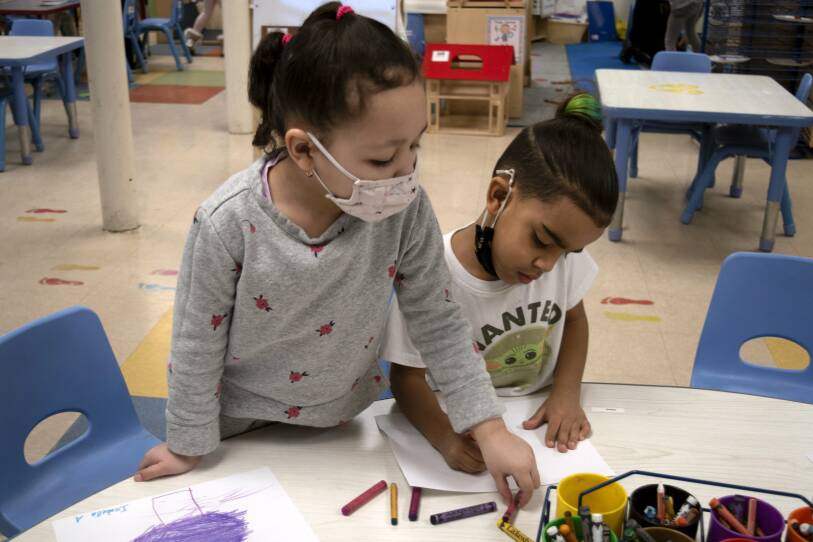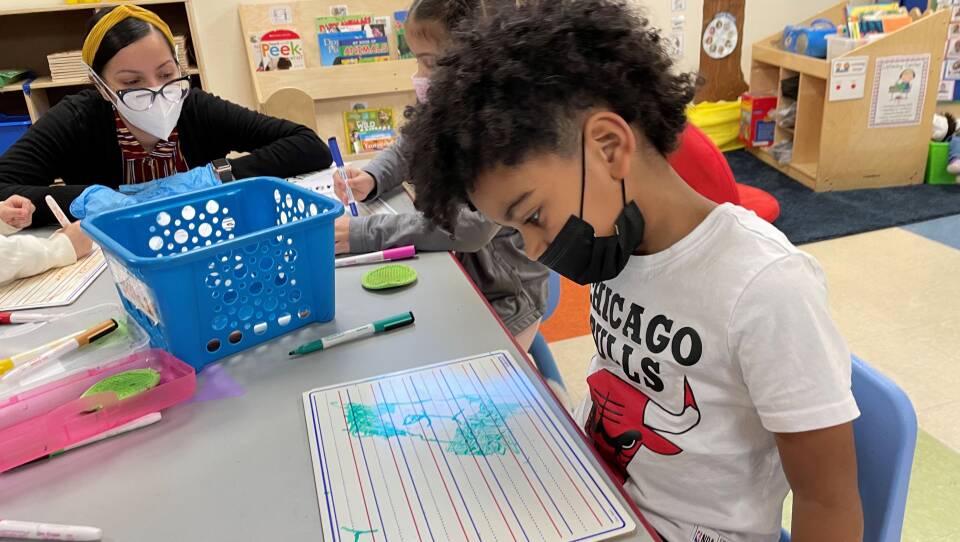At a Lawrence daycare run by a nonprofit called The Community Group, the talk of the day was "Goldilocks" and her legendary home invasion.
Now — much like the three bears' chairs that Goldilocks tried before finding the one that fit just right — there are efforts at big, medium and small levels of government to make childcare like this more accessible to low-income and middle-class families. Historically, that's been a challenge both in Massachusetts and nationwide, where many families who can't afford childcare do not qualify for help.
The federal Build Back Better legislation championed by President Joe Biden would have dramatically expanded childcare access. It failed to get the 51 votes necessary to pass the Senate late last year, but it turns out the childcare part of that legislation may not be entirely dead.
Congresswoman Katherine Clark spoke confidently about the issue recently on a call with members of the business community.
"It is the issue that has survived all the iterations, and it is going to be the issue that we are able to get over the line with in the Build Back Better agenda," Clark told the group.
William Eddy of the Massachusetts Association of Early Education and Care said that would be great, but he's not holding his breath.
"I pride myself on living in the world of reality," he told GBH News.
And for now, Eddy said, the reality is that expanding access to childcare is most likely to come from the state.
Massachusetts does offer vouchers to help low-income families pay for daycare. But the state system leaves out many low-income and middle-class families who can't afford childcare. For families who do qualify for the state voucher, there's currently a waitlist of 15,000 children.
But many families who can't afford daycare don't qualify for help. A single parent making $45,000 a year isn't eligible for a state voucher, even though childcare for an infant in Massachusetts costs an average of $21,000 a year, according to the Economic Policy Institute think tank.
A state bill known as Common Start would dramatically expand access. But, still living in what he calls the "world of reality," Eddy said Massachusetts can't afford that.
"The estimates to build an entitlement program, birth through [age] 5, are between $5 [billion] and $6 billion, or one-ninth of our entire state budget," Eddy said. "And so the question then turns to how does the state move forward to try to make a positive impact — significant systemic impact — on early education?"
That question is currently being studied by a state commission focused on early education and care, co-chaired by Rep. Alice Peisch (D-Wellesley, Weston, and precinct 4 in Wayland), who is also co-chair of the state's education committee. The commission's final report is expected in March, and Peisch said it will include a range of short- and long-term recommendations.
"I think they will deal with everything from staffing challenges to quality of the programs," Peisch said. "But from my perspective, most importantly, having a broadening access to high-quality early education and care to the most needy of our residents in Massachusetts."
One of the places Peisch said she sees inspiration for the future of the state's childcare system is in that daycare classroom in Lawrence.

The childcare nonprofit The Community Group helped design a scholarship program for the city of Lawrence using federal funding to help get more low-income and middle-class families into subsidized daycare.
"You're helping a parent be able to go to work and make a better living and learn skills to be able to create a better life for themselves, and hopefully get to a point where they don't have to have the program because they can't afford the childcare," said Martha Velez, Lawrence's director of health and human services.
The Lawrence scholarship has a higher income limit than the state subsidy. And for families on the state’s waiting list, the scholarship can serve as a bridge to get them daycare until they get that state voucher.
"So a family that comes in that is already on the state waitlist is able to get a voucher right away so they don't have to wait and they are able to get a job and start on their job right away," said Maria Gonzalez Moeller, CEO of The Community Group. "Once that family qualifies for a state voucher, then we transition that family so it acts as a bridge between now and when they finally come up on the state waitlist for childcare subsidy."
The Lawrence scholarship also simplified the documentation requirements to make it easier for families to apply for the help.
The scholarship program has placed 289 Lawrence children in daycares around the city. Gonzalez Moeller and other advocates for childcare say the Lawrence program is a model that could expand access to early childhood programs across Massachusetts.
"The results that we've gotten from this program show that there is something not working with the current program at the state level, and that there are adjustments that we can make to increase access at the state level," she said.







